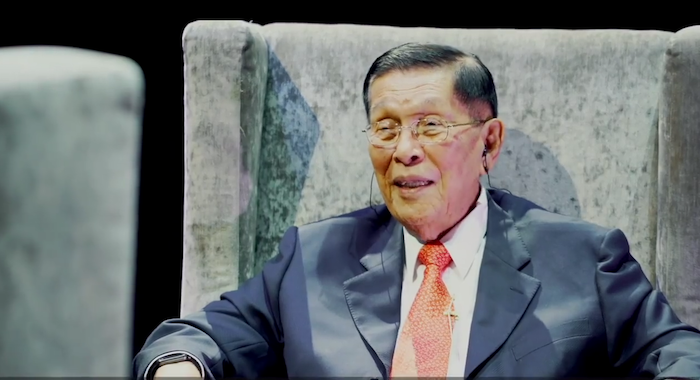Former Senator Juan Ponce Enrile, the country’s Defense Minister during the country’s martial law years, appeared yesterday on a now-viral Facebook video interview where he said that the country was “peaceful” and that Filipinos were “free” during those tumultuous years.
He also denied that thousands of Filipinos were detained and killed during martial law, despite proof that countless human rights violations occurred during that time.
Enrile was interviewed in the video by Ferdinand “Bongbong” Marcos Jr., also a former senator. The video, which has been shared more than 12,000 times, was posted on Bongbong’s official Facebook account.
Bongbong’s father, former president Ferdinand Sr., declared martial law on Sept. 21, 1972, and lifted it on Jan. 17, 1981.
Ferdinand Sr. remained in power until 1986, the year he was removed from office by the People Power Revolution which brought Corazon Aquino into the presidency.
The bloodless coup was led by Enrile himself and another Marcos protégé, Armed Forces Chief of Staff Fidel Ramos, who would also become the country’s president.
Numerous human rights violations occurred during martial law. In May this year, ABS-CBN News reported that more than 11,100 victims of human rights abuses received compensation from the government, with the amount taken from the Marcos family’s Swiss bank deposits worth PHP10 billion (more than US$186,993,470).
To honor the victims, a law called the Human Rights Victims Reparation and Recognition Act of 2013 mandates that the government should recognize the heroism of all victims of torture, execution, and other human rights violations.
It also states that schools in the country should teach students about the atrocities which were committed during the martial law.
According to Bongbong, the interview with Enrile was conducted because Filipino millennials have “a different approach to history,” and that as the “best and most authoritative person,” Enrile can explain why Ferdinand Sr. decided to declare martial law.
Enrile said there was “a need” back then for Ferdinand Sr. to declare it.
He said: “We were dealing with separatism in Mindanao. We were dealing with a very strong communist party. We were dealing with the onset of drug menace in the country. We were dealing with political warlords over the land and the high criminality in the land.”
He also said that the government had learned that the Liberal Party, led by Ferdinand Sr.’s fiercest critic Benigno “Ninoy” Aquino Jr., was going to collaborate with the Communist Party of the Philippines (CPP) and its armed wing, the New People’s Army.
He said: “One of the reasons why President Marcos finally declared martial law was because there was already a working coalition between the Liberal Party and the New People’s Army. And President Marcos realized that the country was too fragile with a very limited military capability to contain the problem.”
He said that Benigno’s brother Paul Aquino was speaking with the leaders of the CPP, which Enrile learned during a meeting with the two brothers in Urdaneta Village in Makati City.
“He (Paul) had a meeting with the leadership of the Communist Party. They were discussing a coalition government,” he said.
He added: “He (Marcos) did not want to declare it (martial law). He was hesitating to use his commander-in-chief powers. Until finally in 1972 he decided [to declare it].”
Enrile also insisted that the martial law years were a peaceful time. He said: “During the first two years, three years of martial law, you can open your window, leave your house nobody will touch it (sic). That’s how peaceful the country was. People were free.”
He also slammed critics who have accused him of jailing and killing Marcos’ critics. He insisted that only Lim Seng, a suspected Chinese drug lord, was executed during Marcos’ regime.
“They claimed we killed a lot of people. When I was interviewed by someone some time ago, I challenged her, name me one that was executed other than Lim Seng.
“[Critics say] that we had 70,000 arrested, which was not true. Maybe if you included the people who violated the curfew and the jaywalkers, maybe you’ll reach that number. [People] were free in fact.”
Enrile also challenged critics to name those who were arrested for their political beliefs.
He said: “Name me one person that was arrested because of political or religious beliefs during that period. None. Name me one person that was arrested simply because he criticized President Marcos. None.”
Enrile’s pronouncements did not sit well with former Commission on Human Rights chairperson Loretta Ann Rosales, who was arrested, detained, and tortured during Martial Law. She told GMA News: “That’s a big, fat lie. That’s a lie. How can he say that, when people he knew were arrested?”
Meanwhile, former Senator Rene Saguisag said one prominent person who disappeared during the martial law years was journalist Primitivo Mijares, who wrote the book Conjugal Dictatorship of Ferdinand and Imelda Marcos. He was believed to have been abducted by the military. And it did not end there: his son Boyet was found dead in Antipolo, his body mutilated.
Saguisag also cited Archimedes Trajano, a student leader who was tortured and killed after asking Bongbong’s sister Imee why she was the National Chairperson of the Kabataang Barangay.
Unsurprisingly, Bongbong’s supporters believed Enrile.
Calling members of the opposition “yellows,” Gilbert Datu wrote: “It is very surprising that [the] opposition does not come head to head with JPE and contest what they are claiming…..Come on Yellows…JPE is still alive…the only person who could answer your long time quaestion/s. (sic)”
Hanz Manuel believed that Enrile was saying “the truth.”
Alec Ares called millennials “stupid” for thinking that fighting the government is “heroism.”





Reader Interactions